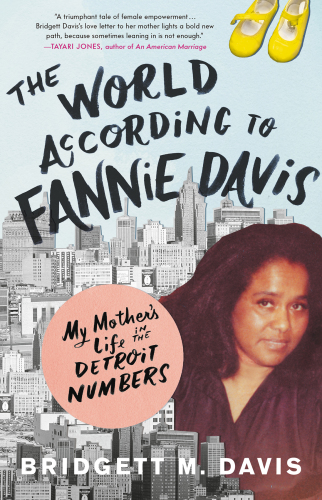
The World According to Fannie Davis
My Mother's Life in the Detroit Numbers
کتاب های مرتبط
- اطلاعات
- نقد و بررسی
- دیدگاه کاربران
نقد و بررسی

September 10, 2018
Novelist Davis (Into the Go-Slow) honors her mother in this lively and heartfelt memoir of growing up in 1960s and ’70s Detroit. Before there was the Michigan Lottery, there was the numbers—an illegal lottery based on three-digit numbers. As Davis notes, it was a “lucrative shadow economy” in African-American communities. Fanny Davis was a feisty and sharply intelligent woman who moved her family from Nashville, Tenn., to Detroit in the early 1960s. There, she learned the numbers ropes and set out to run her own operation; in a short time she was able to provide generously for her family with an upscale house, a stocked refrigerator, shopping sprees at tony department stores, and even a trip to Miami Beach’s Fontainebleau resort. Alongside her mother’s story, Davis chronicles the hardships African-Americans suffered—predatory real estate schemes, discriminatory treatment in stores, and police abuse. Looking back as an adult, Davis realizes that her mother took risks in running her business, but recalls fondly a childhood during which she always felt secure. This charming tale of a strong and inspirational woman offers a tantalizing glimpse into the past, savoring the good without sugarcoating the bad. Agent: Anjali Singh, Ayesha Pande Literary.

November 1, 2018
A remarkable story of a mother whose "ingenuity and talent and dogged pursuit of happiness made possible [her family's] beautiful home, brimming refrigerator and quality education."Fannie Davis was an amazing woman. Sharp and unwilling to be hemmed in by the dual restrictions of race and gender, she did what it took to raise a family and to uplift a community. In 1960s and '70s Detroit, she ran the "Numbers," an illegal lottery that was nonetheless central to many urban and especially African-American communities, especially in the era before states realized that licit gambling could be a lucrative trade and even as they cracked down on the gambling they defined as illicit. Above all, Fannie Davis was a mother. In this admiring and highly compelling memoir, Bridgett Davis (Creative, Film and Narrative Writing/Baruch Coll.; Into the Go-Slow, 2014, etc.) tells the story of her beloved mother. The author knew that her mom's role in the Numbers had to be kept secret, but she also knew that it was not shameful. Placing her subject in the larger historical contexts of the African-American and urban experiences and the histories of Detroit and of underground entrepreneurship embodied in the Numbers, and framing it within numerous vital postwar trends, the author is especially insightful about how her mother embodied the emergence of a "blue collar, black-bourgeoisie." Although there was considerable risk in running the Numbers, it also provided a path forward to a comfortable lifestyle otherwise nearly unimaginable. While critics liked to paint the game as a path toward dissolution, for the author--and many others--it was anything but. This is not a story about capitalizing on degeneracy. It is one of hope and hustling in a world where to have the former almost demanded the latter.This outstanding book is a tribute to one woman but will surely speak to the experiences of many.
COPYRIGHT(2018) Kirkus Reviews, ALL RIGHTS RESERVED.

December 1, 2018
In this memoir, Davis paints a moving portrait of her mother, who was a Numbers runner in Detroit for decades. The Numbers is an underground lottery that started in the early 1920s, largely in the black community. Fannie Davis was one of only two women who banked the Numbers, rare in the male-dominated field. The author learned at a young age to keep her mother's career a secret, despite her immense pride in Fannie's success and entrepreneurship. Fannie earned enough to purchase a beautiful home in Detroit for the Davis family and was known for her generosity toward her community throughout her life. Bridgett describes her parents' early days in Detroit as well as her own experiences with pivotal moments in history, including the rise of Motown, the city's 1967 uprising, and Michigan's vote to create a legal lottery system. Her writing feels rooted in the city and its changing landscape. Combining historical research with extensive interviews, The World according to Fannie Davis is an engrossing tribute to a vibrant, hardworking, unforgettable woman.(Reprinted with permission of Booklist, copyright 2018, American Library Association.)

August 1, 2018
Journalism professor and novelist Davis recalls her bighearted mother, who in 1960s and 1970s Detroit supported her family through the underground lottery called The Numbers. With a 50,000-copy first printing.
Copyright 2018 Library Journal, LLC Used with permission.

November 1, 2018
By all accounts, Fannie Davis was a lucky woman. Moving from segregated Nashville to Detroit in the 1950s, she realized her husband, John T, was unable to support the family as an autoworker. She made the choice to start a homegrown business as a bookie for the Numbers, a "ubiquitous" lottery. Her success allowed her to provide for her family better than most blacks or women could hope for at the time. But in 1972, when Michigan voted to lift the legislative ban on a state lottery and then went from a weekly to daily lottery in 1977, the government was running their own numbers game. Fannie sustained her business for more than 30 years, but this challenge ended her reign. Novelist Davis (journalism, Baruch Coll., CUNY; Into the Go-Slow) switches to nonfiction to recount her mother's "triumphant Great Migration tale." But this isn't Fanny's story alone, it's also a sociological urban history of Detroit as a Northern sanctuary city that still suffered racial constraints. VERDICT The Numbers' background is rarely explored, and works such as Don Liddick's The Mob's Daily Number lack the personal connection Davis so vividly exploits in this successful combination of family and sociological history.--Jessica Bushore, Xenia, OH
Copyright 2018 Library Journal, LLC Used with permission.

























دیدگاه کاربران